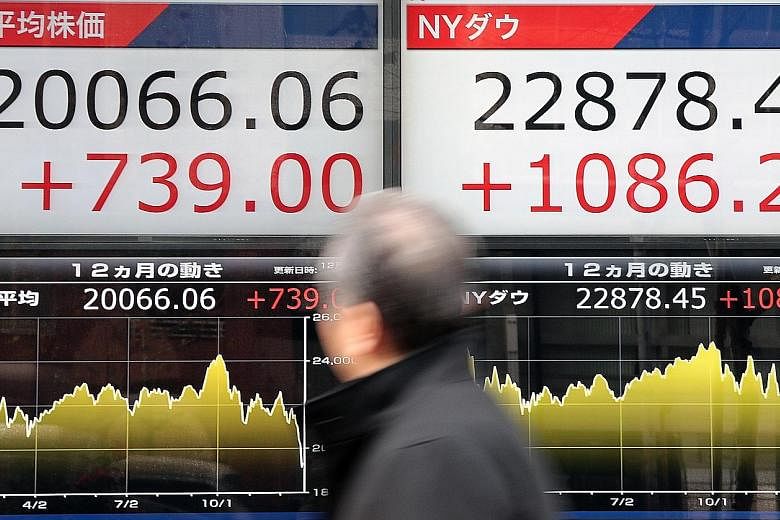Wall Street's record rebound gave a much-needed boost to battered markets across Asia, but sentiment remains cautious as headwinds from trade tensions and global growth remain.
After its worst-ever Christmas Eve sell-off, the Dow Jones Industrial Average posted its largest single-day point gain in history, skyrocketing 1,086.25 points, or 4.98 per cent.
Strong US holiday sales coupled with a report that a US delegation will visit Beijing early next year to revive trade talks helped plug a global rout that started last week over signs of political disarray in the United States as well as President Donald Trump's hostile stance towards the Federal Reserve chairman.
Wall Street's rebound helped pull Japan's index out of the bear market it had entered earlier this week, with the Nikkei up nearly 4 per cent yesterday.
Taiwan jumped 1.72 per cent while Singapore, Malaysia and Jakarta were each up more than 1 per cent.
But Hong Kong, Shanghai and Shenzhen turned negative in afternoon trading after climbing about 1 per cent earlier in the day.
Not helping were reports that Chinese state oil major Sinopec had suspended two top executives at its trading arm and that China's industrial profits for December had fallen for the first time in three years.
"China's economic growth, in my books, remains to be the most significant market risk as we enter 2019," Mr Stephen Innes, head of Asia-Pacific trading at online broker Oanda, said.
US stock futures also pointed lower in the Asian trading session yesterday, raising questions about whether their rally is sustainable.
This as global growth looks set to slow and uncertainty remains over the US-China trade war, Brexit, the impasse over the US government shutdown and interest rate outlook next year.
CMC Markets analyst Margaret Yang said: "This could be a temporary rebound due to short covering and animal spirits. Investors are still cautious as there's no relief from the problems that have weighed on equities."
FXTM chief market strategist Hussein Sayed also warned that it is "challenging to build on a single-day rally".
"To call a bottom, we need at least a couple of days of strength, not just in price but also in trading volume, breadth of the market, and fundamentally supported environment. So far, we don't see a shift in fundamentals.
"Trade tensions between the US and China remain the biggest unknown factor for 2019. US politics and the government shutdown also require caution," he said.
Small wonder that the STI could not hold on to all its gains yesterday, as nervous traders took profit. Singapore stocks jumped as much as 2.1 per cent yesterday morning but closed 1.1 per cent higher.
Local banks and oil and gas counters rallied on a strong rebound in oil prices on Wednesday after the Organization of the Petroleum Exporting Countries signed a landmark agreement to cut production.
OCBC jumped 1.6 per cent to $11.13, UOB rose 1.2 per cent to $24.32 and DBS was up 0.7 per cent to $23.45.
Keppel Corp and Sembcorp Industries were each up about 2.5 per cent, while Sembcorp Marine rose 0.7 per cent.
Tech heavyweight Venture Corp also helped with the heavy lifting, jumping 1.1 per cent to $13.69.


